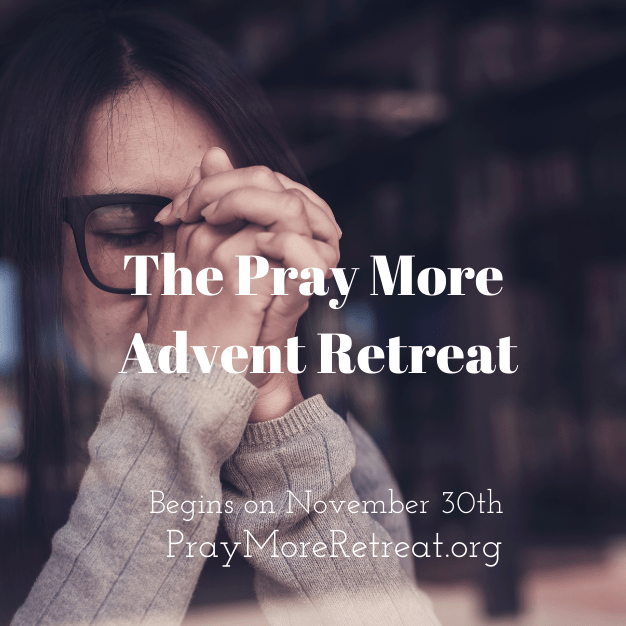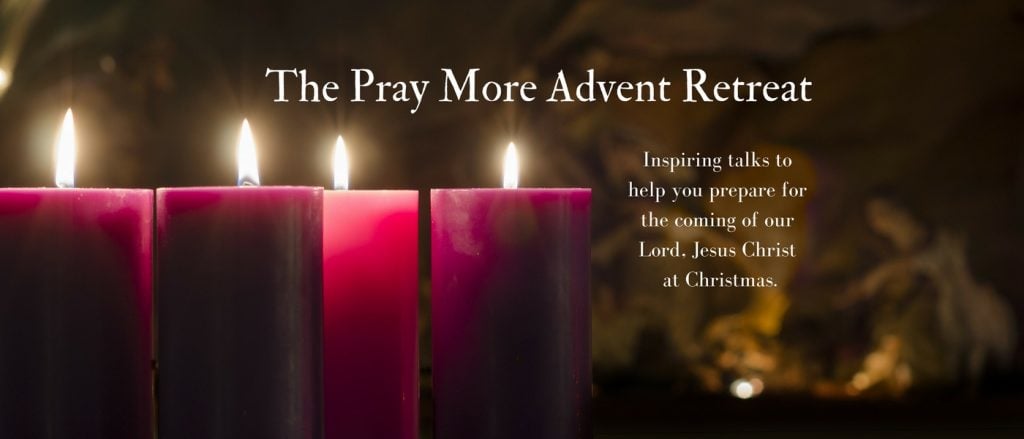Summary
Tim discusses forgiveness and unforgiveness, and the impact these have in our lives and in our relationship with the Lord. He reminds us of the importance of seeking forgiveness in our lives as a Catholic, to fully live a life meaningfully dedicated, and in proximity with the Lord, as well as how unforgiveness can sometimes be the one thing keeping us from that.
Thank you for watching and participating in this retreat!
Not Registered, yet? Don’t miss the rest of the talks! Register for the Pray More Retreat!
Downloads
Audio MP3
Click here to download audio file.
Printable Study Guide PDF
Click here to download the printable study guide.
Printable Transcript PDF
Click here to download the transcript of the video presentation.
Reflective Study Guide Questions
“If you forgive others their transgressions, your heavenly Father will forgive you.”– Mt. 6:14
- Tim says that the importance of forgiveness is often overlooked or forgotten in the spiritual life, despite the fact that unforgiveness can be a large hindrance to advancing spiritually. How much focus have you placed on forgiveness in your life?
- When others hurt us, we sometimes react by harboring the hurt and acting as if the hurt was not important, or by exacting and seeking to find justice for ourselves in an unholy way. Have you ever reacted to a hurt in one of these ways? How can you work on reacting to hurt in a healthier way?
- Sometimes we have a need for forgiveness towards God because of instances when we have felt disappointed in His response to us. Have you ever felt disappointed in God’s response to you? How can you work on improving your relationship with God through forgiveness?
- We often have the need to forgive ourselves for failings and mistakes of the past. Holding onto these past failures can allow the devil to prevent us from advancing spiritually. Do you have a need for forgiveness towards yourself? How can you work on allowing God to love you for who you are, no matter what mistakes you have made?
Text: Living Out Our Forgiveness
Hi, everyone. It’s good to be back with you for my second talk of the Pray More Novena Advent Retreat. If you didn’t watch my first talk, my name is Tim Glemkowski and I live in Denver, Colorado, and work here for the Archdiocese of Denver and live here with my wife and our three young kids. And kind of excited to talk for the second time about a topic that I think is actually kind of underrated sometimes in terms of its importance, which is funny, given that Jesus specifically mentions it in the, Our Father, you know, this one formula for prayer, right, that He teaches, and it’s the topic of forgiveness.
Forgiveness
So I think, you know, we sometimes think of forgiveness as like, you know, maybe one of the virtues or like something we should do, or like, you know, kind of an accidental part of the Christian life. It’s like, well, a Christian should forgive, but it’s really incredible how much Jesus really makes it central to the Christian life. You know, forgive us our trespasses as we forgive those who trespass against us. And I think sometimes as Catholics, we’re not all the time engaged enough in the practice of forgiveness. Like either what we’ll do is we’ll kind of treat forgiveness in kind of a cursory way where we really just kind of like gloss over hurts or we’ll, you know, really kind of like think we’re trying to forgive, but we don’t really understand enough about the process of forgiveness or walking through the process of forgiveness to find real freedom, because that’s ultimately what it’s about is forgiveness.
The fundamental idea behind forgiveness is like all of us are going to be disappointed and hurt in life. At some point like someone will hurt us or has hurt us in some way. And unforgiveness, if it settles into the human heart, becomes an incredible place of bondage. Like it’s a great place where the devil can just hook into us and really, you know, not allow us to find the real freedom that we’re made for in Jesus Christ. We’re made for healing and freedom in Christ. And unforgiveness is one of those things. Even if you talk to people who do a lot of, kind of like, you know, spiritual warfare type prayers, unforgiveness is one of the deepest things that really roots and locks people in a place where they’re often unable to come out, you know, like they don’t really, it becomes a wound in them that needs to be addressed and healed and really engaged with, in order to find the freedom in Christ that we’re made for.
A Sad Experience
I remember I used to help a lady at our church to watch her husband. And sometimes he would tell stories. He was very older man. Like he was getting, you know, was kind of losing some of his mental, you know, faculties a little bit and something that would come up, he would often repeat topics. And often, like the topics that would come back up were hurts. You know, these hurts or different complaints, things that had happened in life that were kind of on his heart. And it’s very sad, right? That these things can, even to the point of like, you know, a very advanced age that sometimes you hear people, and they’ll talk about different things that happened when they were a kid or when they were, you know, an adult or different disappointments or hurts. And they really get like locked in these places where it’s very difficult for them to forgive and to come out.
Three Different Types of Forgiveness
And so, what I wanted to talk about is kind of three different types of forgiveness and kind of focus a little bit, just make one or two points on each. Like each of these could be like, you know, hour-long talks, but really just want to give like one or two kind of key points to consider with each to hopefully help us all find the freedom in Christ that we’re made for.
Harborers and Exactors
So, the first is the idea of forgiving others, right? Like, so when others hurt us, and they’re always going to hurt us, or even when we perceive a hurt like they might not even be aware of that they’ve hurt us, or sometimes like real injustice can happen to us, right? We might lose a job for like very unfair reasons or get cheated or, you know, find, you know, people are rude to us or even just someone, you know, walking down the street or something like that, we’d be hurt in different ways by others. And really, I think, sometimes there are two main types of reactions that we might have to that kind of hurt from others is we might be a harborer or we might be an exactor.
So I think harborers, what they do is they think that they’re forgiving. But in reality, they’re just glossing over the hurt. They’re just saying, like, instead of saying, I forgive you, they’re saying it’s fine, which is very different, right? It’s one thing to say, you did hurt me, and I forgive you. It acknowledges the evil that was done. And it still says in Jesus Christ, I am a new creation in baptism and so as you know, sitting with Christ, I can offer this kind of forgiveness, right? Where I can say like, with Him, I want to love you the way Christ would love you. And so, even though you’ve hurt me, I’m still going to choose to forgive you.
And I think what the harborer really needs to do is they really need to count the cost. Like I think that’s one of the key steps here is sometimes we harbor because we’re not willing to really admit how much it hurt us to have someone hurt us. Like how much it hurts to have your mom not love you the way she was supposed to, or the faults of your dad or a sibling or something. Like these hurts that enter in our lives, we don’t want to count the cost. And so what we do instead is we harbor. We say it’s fine. And what we mean is we just push it deeper and deeper and deeper, right? Until we hope that it just goes away someday. But we harbor.
The second type of unforgiveness that I think when others have hurt us that we can do as the exactor. The exactor is a gossip, right? Like the exactor, what they want to do, is they want to extract their pound of flesh for the hurt that was given. So they tell everybody the story about how hurt they were and how unfair it was, or they even, you know, might just, maybe if they’re not telling everybody or gossiping about it, they’re finding ways to undermine that person, right? They’re going to get their retribution, or they’re going to find justice for themselves by exacting from the person, you know, how they’ve been hurt.
I think what the exactor needs to remember is that justice will flourish in his time and fullness of peace forever. Like the Lord, nothing that’s ever done to us in this life will ever like lack justice. We might not see it on this earth, but like there is an eternal justice that is not ours to exact but will be exacted at some point. And so, what we can even do is, is in Christ again, offering forgiveness instead of exacting, will hopefully, you know, take away some of the suffering that might come in the next life for the person who’s hurt us, right? Where we can actually take and find, the exactor wants to find positive momentum for their hurt. And so the positive momentum they can find is actively praying for that person. So that that person isn’t, you know, the eternal justice that we know will be meted out to them, might be instead, you know, mitigated by our prayer, by our intercessory prayer.
Forgiveness of God
Second type of prayer I want to talk about is forgiveness of God. So, here’s the reality, right? Like when you give your life to God, you’re going to be living with him for a very long time. And at some point in your life, God is going to disappoint you. Like, it’s just a fact of the Christian life is that like, at some point suffering will enter into your life, and there’ll be situations where you call out to God and you feel like He doesn’t answer. And the reality here is that the only answer God really gives in some ways to this problem of suffering or of the fact that in this life often we will be disappointed by what God does or doesn’t do for us, how He disappoints us.
The only answer He gives us is the answer He gives to Job, which after all Job’s sufferings, he cries out to God. And God says to him, were you there when I laid the foundations of the earth? Were you there when I created the world? And what he’s saying is like, there’s a perspective here that you can’t see, but I am still God and I am still good. And I am still all powerful. Like the temptation will always be when we’re disappointed by God to either think he’s not all good, or he’s not all powerful. It’s got to be one of the two, right? Because if He was all good and all powerful than He would have fixed our situation, right? Of course.
And so I think the reality there is that at the end of the day, like the idea of having to forgive God is about like acknowledging at the end of the day, like that God is God. And that He’s always all good and all powerful, but it’s also about recognizing that He’s our father enough to complain to him. And there’s a complaining that can happen in faith, where we complain to a God who is God. And there’s a complaining that can happen where we turn away from God, right? And we start to try to fix the situation ourselves, but really it takes kind of an open-heartedness and a deep relationship with God to just admit You are God, and You are good, and You are all powerful and You can do great things in my life. And I don’t know all the reasons why You didn’t do X, or You did do X, but I trust anyway.
And sometimes, later in retrospect, we can go back into those places and really find, you know, wisdom in painful experiences that we didn’t know was there. You know, we can look back later in hindsight and say, oh, I see why you did that. Or I see why you didn’t do that. Or I see at least what good came out of that. And I look forward and hope to the good and the restoration of all things in heaven, where every tear will be wiped away, right? Like Revelation says.
Forgiveness of Self
The last type of forgiveness that we have to talk about is the forgiveness of self. So, the reality is that a lot of us stay in bondage and find a lack of freedom in Christ because of our own shame, our own experience of shame. And it’s a really like simple tool of the devil to keep us from progressing in the spiritual life and progressing in intimacy with God because that kind of intimacy requires confidence. And sometimes the waves that we’re walking on, that we’re sinking under are the waves of the unforgiveness that’s in our heart toward ourselves because of the past things that we did. Instead of letting the past be in the past and letting it be covered in the precious blood of Jesus, we bring the past into the future and bring it up and keep it in front of us like a mask between us and God to say, this is why you can’t love me. This is why I’m not good enough to be loved.
And the reality is that Saint Paul says it was while we were still sinners that Christ Jesus died for us, like our forgiveness or the grace that’s offered to us by Christ has never been dependent on our own moral perfection. And it’s never been dependent on our own earning and striving. It’s always been dependent on a God who loved us even while we were small and even while we were little, and even while we were ugly and wounded and broken.
And if we can, sometimes like regret and regret for the past can be a form of pride almost where it’s like, well, I should have done better. It’s like, no, you shouldn’t have, you know, none of us should have, but that’s the amazing reality of like, what Jesus Christ did for us is that while we were still sinners, he died for us even while we didn’t deserve it, and you didn’t deserve it. And you’ve done things that like are worth being ashamed of. But if you stay locked in your shame, if you stay locked in your regret, then you’re never going to progress in a relationship with God, because He wants you to experience freedom from those things and to not be, you know, just kind of stuck in them forever. And so sometimes that can just really be allowing like, God to love you. Like letting God love you, even in who you are and not in who you wish you had been, or who you wish you were now can be like a really powerful antidote to the pride that says I have to earn it, or I have to achieve it.
Recap
So, forgiveness of others. Are you a harborer? Are you an exactor? Forgiveness of God. Do you let the disappointments that will inevitably come in following God, keep you from remembering that God is all good and all powerful? And then forgiveness of self. Don’t let shame lock you in a place where you can’t progress in your relationship with God.
So, thanks so much for watching. And I hope by engaging with these practices of counting the cost of really, of offering our joyful complaint, our hopeful complaint to God, and really allowing the Lord to love us. I hope these practices of engaging in the discipline of forgiveness every day of our life actively can bring you a new spiritual freedom and a newfound joy, especially in this Advent season. So, thanks so much for watching, and I hope it’s a blessed and Merry Christmas for you. So, God bless.
About Tim Glemkowski

Tim Glemkowski is the Director of Strategy for the Archdiocese of Denver, helping to lead mission and renewal initiatives. He is the former founder and president of L’Alto Catholic Institute and Revive Parishes. Tim authored Made for Mission: Renewing Your Parish Culture, which was released in Fall 2019 through Our Sunday Visitor. He is an international speaker who has also consulted for many organizations, dioceses, and parishes. Tim and his wife, Maggie, live in Littleton, CO with their three young children.

